How long can you survive without water?
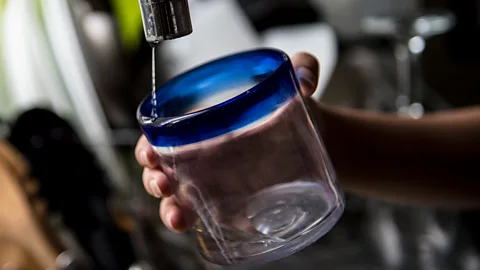 Getty Images
Getty ImagesWater is one of the vital ingredients for life on Earth, but what happens to us if you suddenly can’t get this precious liquid?
The river wasn’t far away. Chaz Powell could see the Zambezi churning over boulders in the gorge a few hundred metres below him. It was tantalisingly close, but out of his reach.
“I can't describe how thirsty I was,” says Powell. Teetering on the edge of a cliff at the top of a gorge, he had run out of water and had no way of getting down to the river. Recalling the precarious position he found himself in, Powell describes an overwhelming feeling of panic as he worried about how to find something to drink.
“By this point I was starting to feel really ill,” he says. “I started to overheat, and my body temperature was just insane.”
Powell, an expedition guide from Shropshire in the UK, was about to experience what it is like to be stranded without the commodity most of us take for granted.
In most developed countries, accessing clean water is as simple as turning on a tap. People in these places pour gallons of it down the drain every day without a thought, as they brush their teeth, shower and flush the toilet. But around 1.1 billion people lack access to safe drinking water around the world, and a total of 2.7 billion find water difficult to access for at least one month of the year.
Water is one of the fundamental ingredients for life on Earth and our bodies are mainly composed of it. When we are forced to go without water, things can turn nasty very fast indeed.
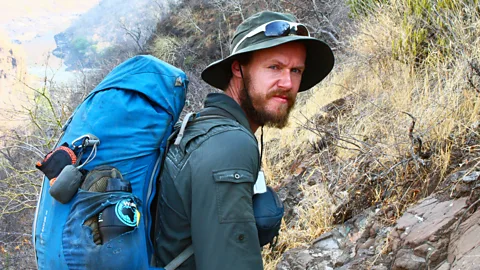 Chaz Powell
Chaz PowellPowell experienced this for himself while two months into a solo expedition walking the length of the Zambezi River, having started his trip at its source in Zambia. He followed the river through eastern Angola, across the borders of Namibia and Botswana, until he reached the gorges at the border of Zambia and Zimbabwe, after Victoria Falls. Here, the terrain became much more difficult to traverse.
“The gorges are steep sloped cliffs that carve through the landscape for around 150 miles,” Powell says. It was August 2016, and the hottest time of year, with temperatures reaching 50C (122F) during the day. Powell, who was 38 at the time, had to walk at this time of the year to avoid the Barotse Floodplains, which are under water for about 90% of the time.
His trek had been going well, covering around 20 miles (36km) each day. But once in the gorges, Powell found himself slowing considerably. “I had walked maybe a couple of miles a day, if that, just going over boulders,” he says. “It was so slow.”
You might also like:
At such a slow pace, Powell calculated it would take a month to get to the other end of the gorges, and with no other people for miles around, he was beginning to run out of food. “The only thing I saw when I was down there were baboons throwing rocks, and huge rapids going through this huge gorge,” he says.
After two weeks of trying to pick his way through the gorge, Powell decided he needed to find another route. On his map he could see another river heading into the Zambezi which looked quite substantial. “I thought to myself I can get on the top it’s going to be about 20km (12 miles) to get to this other river,” he says. “But I didn't know what the top of the land was going to be like at this point, I just thought ‘it’s potentially four hours fast walking, I can do it’.”
Setting off at 4am, Powell climbed out of the gorge with two-litre water bottles. He had been used to drinking straight out of the Zambezi, so didn’t foresee the need to carry any more than that. When he began walking it was already 48C (118F), and three hours later he made it out of the gorge, which he thinks was between 750m (2,475ft) and one kilometre of ascent. At this point, he had one water bottle left. But when he reached the top it was not what he expected.
“In my mind at the top is going to be very flat and easier to walk, but it was just completely overgrown with thorns and it was just a series of little hills going down to the gorge” says Powell. After three hours of walking around in circles looking for a path, he completely ran out of water.
“I’d probably walked about a couple of kilometres, if that,” he says. “I hadn’t even got away from the gorge itself, so I decided I was going to try and get back down.” But he wasn’t in the same place as where he had climbed out, and he was on the edge of a cliff. He could see the river far below him in the gorge, but there was no way of getting down.
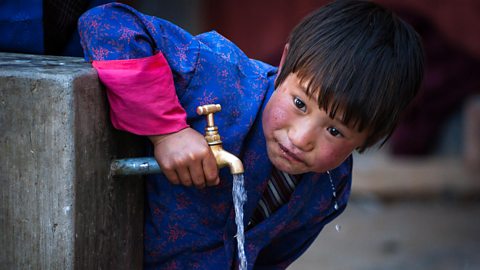 Alamy
AlamyOn average, water makes up about 60-70% of the human body, largely depending on your age. Our bodies lose water through our urine, sweat, faeces and breath, so we have to continually replace this by drinking and eating (around a third of the water we consume comes from our food). If we don’t do this, our bodies can become dehydrated.
The first stage of dehydration is thirst, which kicks in when 2% of body weight is lost. “When thirst kicks in, your body clings to all remaining moisture,” says Dileep Lobo, professor of gastrointestinal surgery, who researches fluids and electrolyte balance. “Your kidneys send less water to your bladder, darkening your urine. As you sweat less, your body temperature rises. Your blood becomes thicker and sluggish. To maintain oxygen levels, your heart rate increases.”
The rate at which dehydration occurs varies according to the extremes placed on the body, but with no water in a climate of 50C (122F), coupled with extreme exercise, dehydration can quickly become lethal. “Humans have an upper limit to heat tolerance, beyond which we suffer heat stress and even death,” says Lobo. “Death rates do climb on extremely cold days, but increase much more steeply on extremely hot ones.”
When exercising in a hot environment, the human body can lose between 1.5-3 litres (2.6-5.3 pints) of water every hour due to sweat. Another 200-1,500ml (0.3-2.6 pints) can be lost as moisture in exhaled breath, depending on the humidity of the surrounding air.
The effect this can start to have on the human body is profound. Even mild dehydration can leave us feeling more tired and less able to perform physically. As we lose more water, our ability to cool down through sweating also decreases, making overheating more of a risk.
With more water leaving our bodies than coming in, our blood starts to thicken and become more concentrated, meaning our cardiovascular system has to work harder to keep our blood pressure up.
Our kidneys try to compensate by retaining more water through reduced urination, water also rushes out of our cells into our blood stream, causing them to shrink in size. When we lose 4% of our body weight as water, blood pressure drops and fainting can occur.
The third stage, when 7% of body weight is lost, is organ damage. “Your body is having trouble maintaining blood pressure,” says Lobo. “To survive, it slows blood flow to non-vital organs, such as your kidneys and gut, causing damage. Without your kidneys filtering your blood, cellular waste quickly builds up. You're literally dying for a glass of water.”
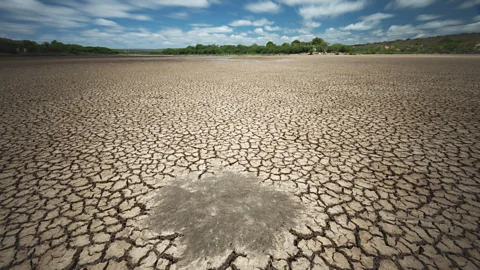 Alamy
AlamyYet some people can not only survive such severe dehydration, they can even still keep performing at high levels. The long-distance runner and coach Alberto Salazar sweated out an estimated 3.06 litres (5.4 pints) per hour in the sweltering Los Angeles heat during the 1984 Olympic Marathon and lost 8% of his body weight. Salazar, however, was able to quickly rehydrate after the marathon and had a team of medical experts to care for him.
With no way of getting to a water source, however, Powell decided to seek help. He activated an SOS phone he was carrying, which linked to a service operated by a US-based company. But when he got through those on the other end could not find anyone nearby to help him. Panic started to set in.
Desperate, Powell dug a hole in the dry soil in an attempt to keep cool, and started to drink his own urine, which he combined with a rehydration sachet.
In a healthy adult, urine is 95% water and the rest is waste products, excreted by the kidneys, including salts and ammonia. When someone is dehydrated the water content becomes markedly reduced, making it more like drinking seawater.
“Although it may be safe to drink urine in the short term to rehydrate, the physiological response to dehydration is to conserve salt and water,” says Lobo. “Urine output decreases, and ultimately the human can develop acute kidney injury and anuria (where the kidneys fail to produce urine). Hence, the quantity of urine in the medium-term will not be enough to sustain adequate hydration.”
Adding rehydration salts without good volumes of water could help Powell to replace salts and sugar, but it also risked causing further negative imbalances in his body. In extreme cases an imbalance in salt levels can lead to seizures and even brain haemorrhage.
In his hole, Powell was cooling down but was also fast becoming more dehydrated. He remembered watching a documentary, Walking the Nile, in which travel writer Matt Power developed heat stroke during an expedition to walk the length of the great river. “I remember thinking it had come on really quickly,” says Powell. “So, in my head, I was thinking ‘I’m overheating, this is happening to me, I’m getting really ill.’”
Eventually the SOS team told Powell they could get a helicopter to him, but it would take four hours. “I’m going to be dead in four hours,” he remembers thinking. “In the end I just said to myself that I'd rather die falling down a cliff than sitting here,” he says. He examined the cliff and saw a few exposed tree roots to hold onto, so decided to make an attempt at climbing down, but fell 15ft (4.5m), slicing his nose open in the process.
His decision to attempt the climb may have been in part due to the dehydration itself. As dehydration worsens it can affect how our brains work, disrupting our mood and our ability to think clearly. The blood flow to our brains, and the brain volume itself, reduces. Mild to moderate levels of dehydration – a loss of 2% or more of body water – can impair our short term memory, our vigilance, arithmetic ability and coordination skills, particularly when performing strenuous activities in hot environments. Some studies, mainly in elderly patients, have also found that dehydration can play a role in delirium.
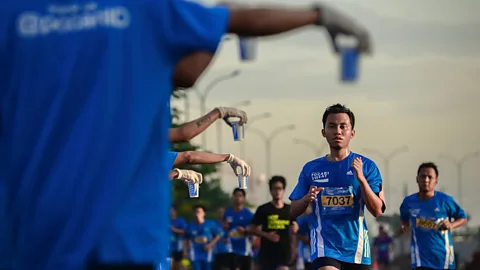 Alamy
AlamyFuelled by adrenaline and the desire to live, however, Powell kept going down, grabbing onto anything he could on the cliff face. When he reached a ledge, he fainted, blacking out for a short while before coming round.
“My hands were bleeding, my face was covered in blood, my legs were bruised,” he says. Even so, Powell kept push himself down the cliff for nearly an hour until he made it back to the river. He had to sit there for an hour, cooling down and drinking water, until he was able to get onto his satellite phone to tell his rescuers he was OK.
“Chaz saved himself by finding a supply of water and shade,” says Natalie Cookson, an emergency medical trainee doctor working in London. “Resting in the shade reduced body temperature, slowing the dehydration process.”
Most importantly, when Powell eventually reached drinking water, it replaced the fluid he had lost. “Dehydration is reversible and by replacing body water, a full recovery is likely,” says Cookson.
Had he not managed to rehydrate, Powell’s kidneys would have started to fail. Without an adequate supply of water flushing through them, toxins can begin to build up, causing the kidneys to stop functioning correctly. This can lead to a form of kidney damage known as acute tubular necrosis, which even if rehydration occurs can take weeks to recover from.
The extra strain on his heart would have also led to irregular heartbeats, falling blood pressure and possibly seizures. Dehydration can also cause vital parts of the cardiovascular system, such as the blood vessels, to harden, increasing the risk of a heart attack.
Being dehydrated in a hot climate only compounds the problem.
“The body is unable to regulate this heat which causes key enzymes in normal metabolic pathways to be destroyed, causing organs like the brain, heart and lungs to de-function” says Cookson. Eventually this can lead to seizures, coma and, as organs start to fail, death.
Exactly how long someone can survive without water is still largely debated. Most scientists agree humans can only go for a few days without taking in any food or water.
In 1944, two scientists deprived themselves of water – one for three days and one for four days – but ate a dry diet of food. By the final day of their experiment, the pair had difficulties swallowing, their faces had become “somewhat pinched and pale”, but they stopped the experiment long before their condition deteriorated to the point where it became dangerous.
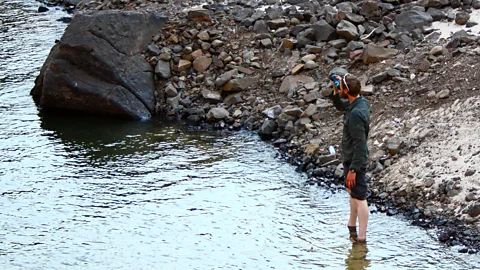 Chaz Powell
Chaz PowellThe ability to go without water can also vary greatly between individuals. There is some evidence, for example, that the human body can adapt to the level of water a person regularly consumes.
The longest someone is known to have gone without water was in the case of Andreas Mihavecz, an 18-year-old Austrian bricklayer who was left locked in a police cell for 18 days in 1979 after the officers on duty forgot about him. His case even made it into the Guinness Book of World Records.
While few of us are likely to experience this kind of extreme dehydration, around four billion people experience severe water scarcity at least one month of the year. Climate change is also likely to make access to clean water supplies harder many parts of the world. According to some estimates, as much as two-thirds of the world’s population will face water shortages by 2025.
As for Powell, his ordeal involved being without water for 10 hours in the searing heat. He was lucky. After returning to Livingston and resting for a week, he was able to continue his journey, taking a different route. He completed his walk in 137 days. Although his experience was a lesson in patience, it also taught him how important water is.
“I certainly don't take it for granted anymore,” he says.
* An earlier version of this article incorrectly stated that it had been Levison Wood who had developed heatstroke during the documentary Walking the Nile when it was his companion Matt Power. This has been corrected.
--
If you liked this story, sign up for the weekly bbc.com features newsletter, called “The Essential List”. A handpicked selection of stories from BBC Future, Culture, Worklife, and Travel, delivered to your inbox every Friday.
